
“Promising” test results for new therapy that could slow down type 1 diabetes
A new therapy has been tested on people with type 1 diabetes, that researchers hope could one day free people from taking daily insulin injections.
Researchers believe the immunotherapy could make it possible to “retrain” the immune system and slow down the progression of type 1 diabetes.
Researchers leading the trial at King’s College London and Cardiff University found there were noticeable changes in the behaviour of the immune systems of people with type 1 diabetes that had been injected with peptides (part of the protein molecules found in beta cells of the pancreas).
The results of the MonoPepT1De were recently published in the journal Science Translational Medicine.
The immunotherapy was tested on 27 people in the UK and researchers hope to continue the study in larger tests to confirm the effectiveness of the treatment.
In type 1 diabetes the pancreas fails to produce insulin and insulin injections are required for life. The cause of type 1 diabetes is unknown but it is thought to be an auto-immune process. In effect the body produces antibodies to the pancreas, damaging it and preventing it producing insulin. Type 1 diabetes only affects about 10% of all people with diabetes and it usually starts below the age of 40.
If left untreated the number of beta cells would slowly decrease and the body would no longer be able to maintain normal blood sugar (blood glucose) levels.

The trial was led by Professor Mark Peakman, whose work is supported by the National Institute for Health Research (NIHR) Biomedical Research Centre (BRC) at Guy’s and St Thomas’ NHS Foundation Trust and King’s College London.
Professor Peakman said: “When someone is diagnosed with type 1 diabetes they still typically have between 15% and 20% of their beta cells. We wanted to see if we could protect these remaining cells by retraining the immune system to stop attacking them.
“We still have a long way to go, but these early results suggest we are heading in the right direction. The peptide technology used in our trial not only appears to be safe for patients at this stage, but it also has a noticeable effect on the immune system.”
There is currently no cure for type 1 diabetes, which can affect major organs in the body, including the heart, blood vessels, nerves, eyes and kidneys. The UK has one of the highest rates of type 1 diabetes in the world with 400,000 people currently living with the condition.
Professor Colin Dayan from Cardiff University, the clinical Chief Investigator for the study, said: “It was encouraging to see that people who receive the treatment needed less insulin to control their blood glucose levels, suggesting that their pancreas was working better.”
Dr Eleanor Kennedy, DRWF Research Manager, said: “This is research done by a great group with a strong track record in unravelling the immune system’s behaviour in type 1 diabetes. The results are promising but it is a small study so more research will need to be carried out to see if these exciting preliminary results can be replicated in a much larger group of patients.”
Following the success of the trial, which was supported by the NIHR BRC at Guy’s and St Thomas’ and King’s College London, King’s and UCB Biopharma (a Belgian Biopharmaceutical company) are working together on the next phase of tests to further study the safety of the treatment.
UCB has acquired exclusive licenses from King’s College London to MonopepT1De and MultipepT1De worldwide.
Read the report in Science Translational Medicine
Support DRWF by making a donation here
Find out more about DRWF-funded research here
Find out more about DRWF fundraising here
For latest update follow DRWF on Facebook, Instagram and Twitter
To receive the charity’s latest bulletins as they become available, please sign up here
Read DRWF diabetes information leaflets here
Join the Diabetes Wellness Network here
I would like to make a regular donation of
I would like to make a single donation of
There are lots of ways to raise money to support
people living with all forms of diabetes.
Bake, Swim, Cycle, Fly ... Do It For DRWF!
Fundraise with us
Recent News


